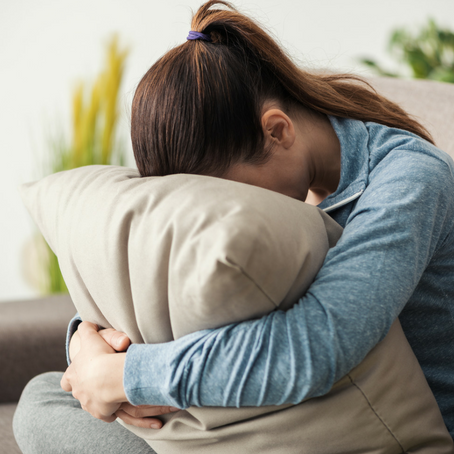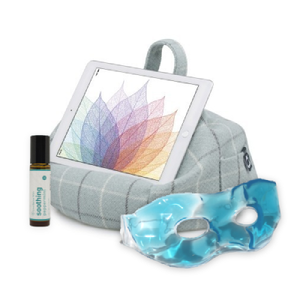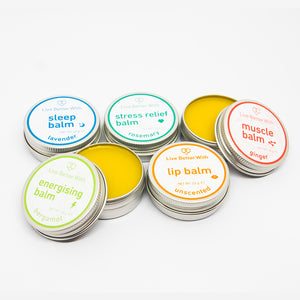Feeling Stressed, Sad or Snappy
Emotions and Mood Swings During the Menopause
During the menopause, you might find that your emotions are all over the place. The emotional symptoms of the menopause are well known, but many women experience huge emotional highs and lows without realising that their mood swings are caused by hormonal changes. This guide provides helpful suggestions, products, and tips to help you cope with emotional instability during the menopause.
This guide will cover:
- Sadness, depression, and emotional crying
- Irritation, frustration, anger, and rage
- Anxiety and stress
What are the emotional symptoms of the menopause?
Emotional triggers are different for everyone, and it’s not always clear what sets off your mood swings and irritability. However, many women do experience these common symptoms:
- Feelings of sadness and depression
- Melancholy
- Aggressiveness
- Anger or feelings of rage
- Sadness and emotional crying or uncontrollable crying
- Lack of motivation
- Irritability and a tendency to be snappy with others
- Tension
- Anxiety and nervousness
- Extreme moods
- Stress
- Mood swings, or quick and unpredictable changes in mood

Why do mood swings happen during the menopause?
- Mood swings during the menopause are caused by changing hormone levels. When you start the menopause, oestrogen levels begin to decline and fluctuate. Your body also produces less progesterone. Both of these hormones influence the production of a neurotransmitter called serotonin. Serotonin regulates your mood. When hormone levels change, so do levels of serotonin, making your emotions less predictable and more extreme.
- Alongside these emotional changes, the menopause can also cause symptoms such as sleeplessness and hot flushes, which can leave you feeling uncomfortable and fatigued. These factors - and others - can also influence your mood. These circumstances can amplify the existing emotional and hormonal changes that you’re dealing with.
How can I cope with sadness, depression, and emotional crying?
Feeling sad is a normal part of the menopause. Remember how you felt when you first got your period? Or when you experienced PMS? Menopause-related sadness is caused by the same fluctuations in hormones, so it’s logical to expect that you may find yourself feeling a bit flat and melancholy.
Many women find that they experience crying spells out of nowhere, just as they did when experiencing PMS. While not always pleasant, remember that this response is the result of your body changing. You’re not going crazy!
Move your body: Gentle exercise is a great way to distract your mind and get those happy-feeling endorphins flowing. Try taking a walk outside and tracking your steps for an extra challenge. Some light stretching with resistance bands can also help to get the blood pumping. If the weather looks unpleasant, practice yoga at home, or do some light cycling on a pedal exerciser (best when placed in front of the TV, so you can exercise and enjoy your favourite shows!)
Get some light: A quick and simple pick-me-up is to spend some time in front of a SAD Lamp. The bright light can boost your mood and stabilise your emotions in as little as 10 minutes. Try keeping a SAD lamp on your desk at the office, or placing it near your favourite armchair at home.
What should I do if I’m feeling irritable, snappy, or angry?
Many women describe experiencing sudden waves of rage and anger during the menopause. Emotional symptoms of the menopause are frustrating in their own right, never mind the range of additional side effects that so many women experience. In addition, hormones can make you feel angry seemingly out of the blue. No matter the cause, here’s how to deal with anger caused by the menopause:
Practice yoga: Yoga can help to regulate your breathing, and the gentle stretching will help to elevate your heart rate and get your blood circulating. Exercise is shown to reduce anger and tension, so if you’re feeling a wave of menopause-related rage, try pulling out your yoga mat and practising a few simple poses. This way, you can harness your angry energy and turn it into something healthy and productive.

Enjoy a massage: Sometimes, it’s best to take a few quiet moments away from whatever is bothering you and do something nice for yourself. One lovely way to really give yourself a break is to enjoy a convenient massage on the sofa or in a comfortable chair.
Practice mindfulness: During the menopause, mindfulness can be an extremely helpful and accessible way of regulating your mood. Mindfulness practices vary, but each one encourages you to focus your attention to your body, your breath, and the present moment. “Quieting the mind” can help you to relieve tension and work through big angry mood swings caused by the menopause. You can also try mindful origami if a focus on breathing isn’t your preference. Many women also enjoy using mindful colouring books.
How can I manage my anxiety and tension?
Anxiety levels can fluctuate during the menopause. You might find yourself unable to sleep due to anxious thoughts or feel like your heart is racing all the time. Managing anxiety and stress can help you to feel more in control of the changes happening in your life.
Breathe deeply: Explore breathing techniques through yoga or using a gentle breathing guide. Practicing mindfulness often includes a focus on the breath, and slowing down your breathing can help your brain to release hormones that reduce your anxiety. Try documenting your experiences in this creative mindfulness guide, or exploring the art of pranayama - an ancient breathing technique.
Use essential oils: Aromatherapy can help to relieve anxiety and stave off stress and tension. Essential oils are known for their aromatherapy benefits and can be used in a variety of ways, so you can choose the method that works best for you. Try diffusing calming lavender oil in the bedroom, applying a chamomile blend to your wrists and forehead with an essential oil rollerball, or adding a few drops of rosemary oil to your bath. However you choose to use them, essential oils can provide quick and convenient relief.
Get better sleep: Sleeping well can help you to have more energy and perspective as you go about your day. Feeling rested reduces that racing-heart feeling that can contribute to further anxiety. Try using a gentle lavender scented warmer before bed, or writing your thoughts down in a journal before you sleep.
The main thing to remember throughout the menopause is that mood swings are completely normal. Your feelings might be unpredictable and intense, but remember that they are temporary. In the meantime, be kind to yourself. This too shall pass.






